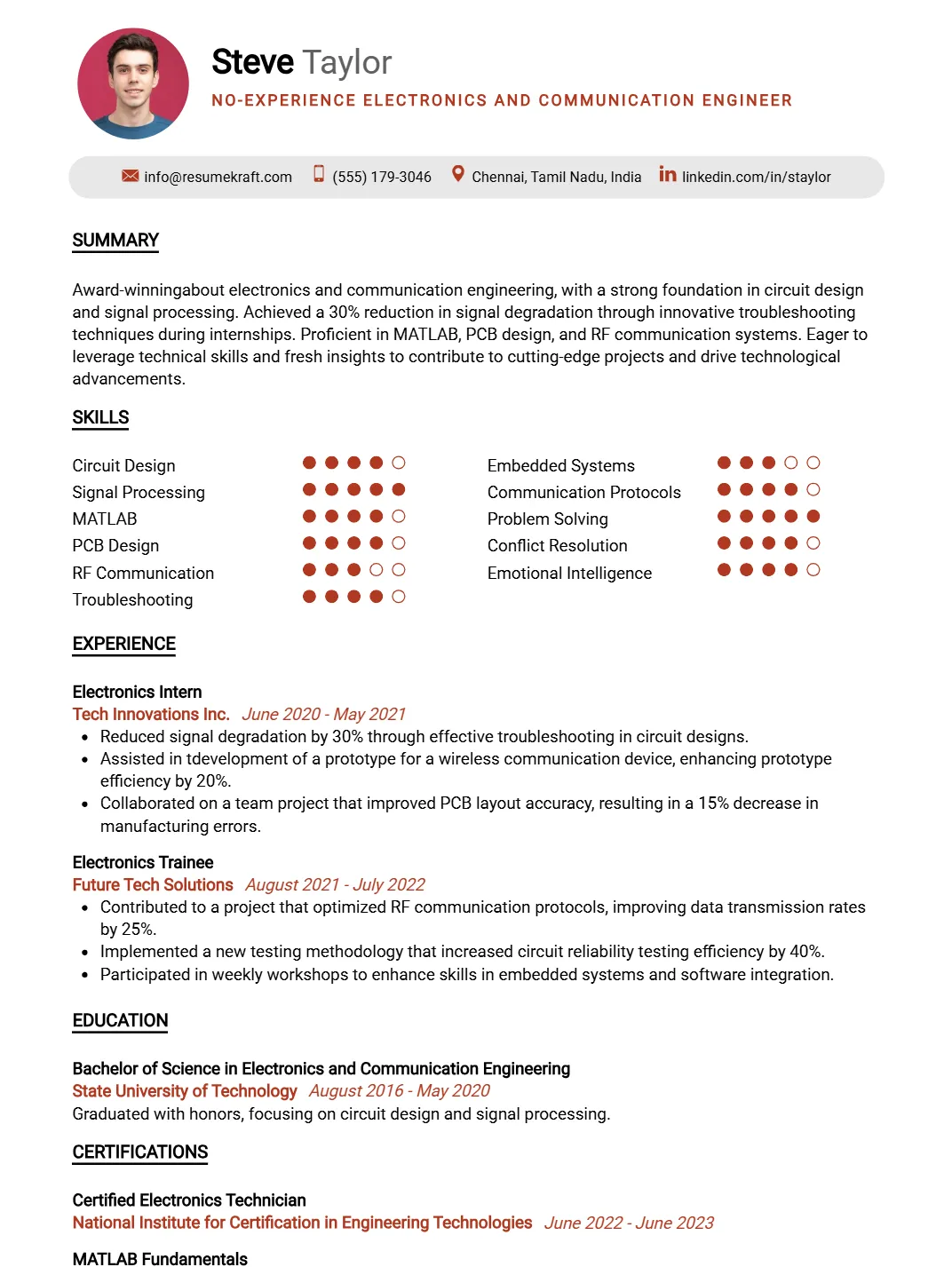
As a fresher in Electronics and Communication Engineering, you step into a dynamic field that drives innovation in technology, telecommunications, and automation. Entry-level professionals often engage in designing, testing, and implementing electronic systems and communication protocols, playing a crucial role in advancing modern society. This career path offers exciting opportunities for new graduates to apply their academic knowledge in real-world scenarios, but it also presents challenges due to competition and limited work experience. This article will guide you in crafting a compelling resume that highlights your strengths, academic projects, and transferable skills, helping you successfully navigate the job market and stand out to potential employers.
- Fresher Electronics and Communication Engineer resume examples
- Fresher Electronics and Communication Engineer resume format
- Fresher Electronics and Communication Engineer resume with no experience
- How to list your hard skills and soft skills on your fresher resume
- How to list your education and certifications on your fresher resume
- How to write your fresher Electronics and Communication Engineer resume summary or objective
- Additional sections for a fresher Electronics and Communication Engineer resume
- Key takeaways for writing a professional fresher Electronics and Communication Engineer resume
- Frequently Asked Questions for Fresher Electronics and Communication Engineer Resumes
- How long should my fresher Electronics and Communication Engineer resume be?
- What is the best format for a fresher Electronics and Communication Engineer resume?
- How can I make my fresher Electronics and Communication Engineer resume stand out without work experience?
- What should I include in my fresher Electronics and Communication Engineer resume if I have no relevant experience?
Fresher Electronics and Communication Engineer resume examples
Resume examples for fresh Electronics and Communication Engineers are invaluable for new graduates and entry-level job seekers. They serve as a practical guide, showcasing how to effectively highlight relevant skills, academic projects, and internships. By examining these examples, beginners can gain insight into what recruiters prioritize in fresh talent, enabling them to create compelling resumes that stand out, even in the absence of extensive work experience.
Fresher Electronics and Communication Engineer Resume
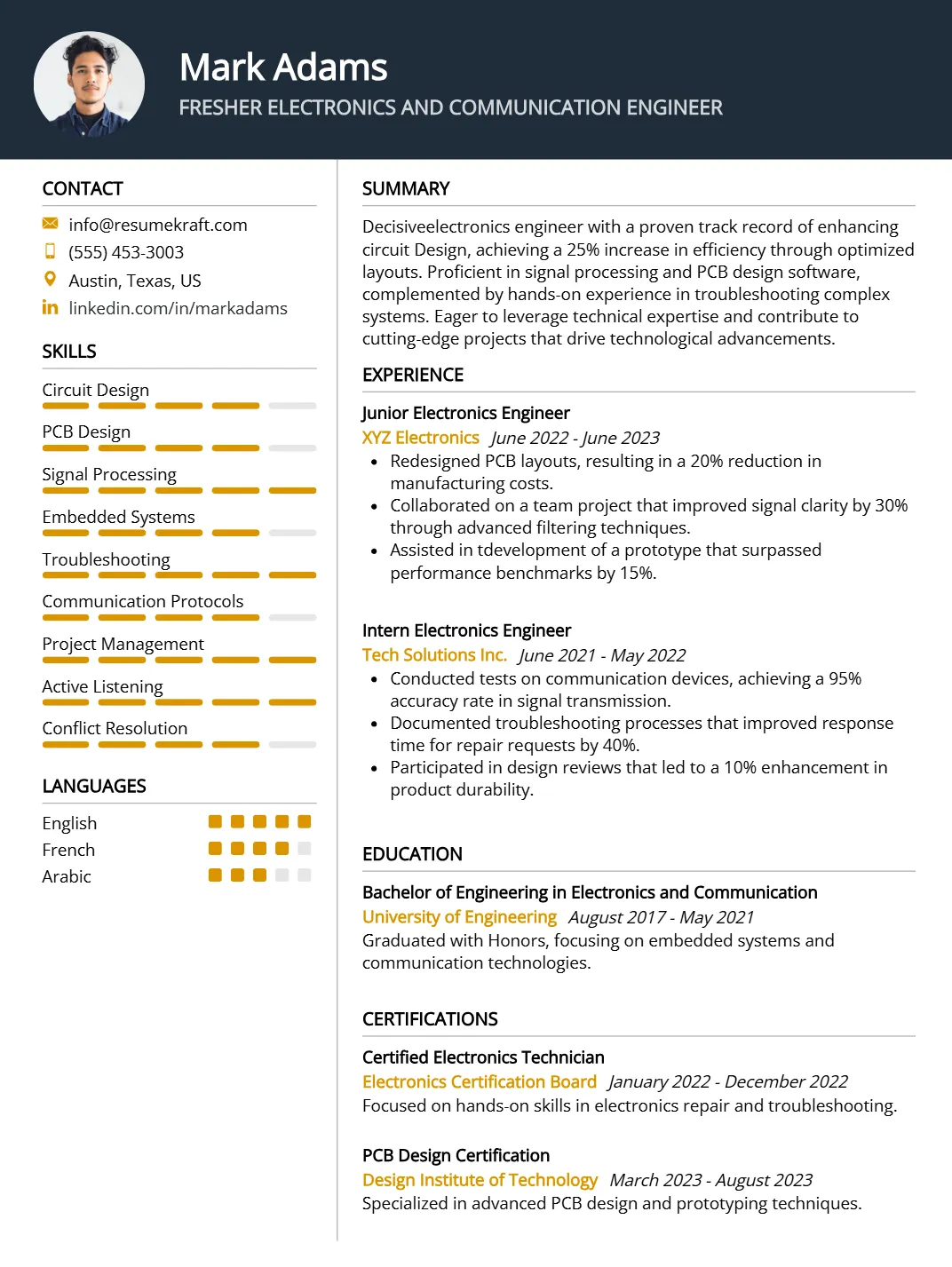
Why This Resume Works
This resume effectively highlights the candidate’s relevant skills, such as Circuit Design and Embedded Systems, directly aligning with the requirements of a Fresher Electronics and Communication Engineer. The structured format showcases experience as a Junior and Intern Electronics Engineer, emphasizing practical knowledge gained over two years. Attention to ATS compatibility is evident through keyword optimization related to electronics engineering. Moreover, strategic presentation of achievements in troubleshooting and PCB design underlines the candidate’s readiness for challenges in the field, making it stand out to potential employers.
Entry-Level Electronics and Communication Engineer Resume
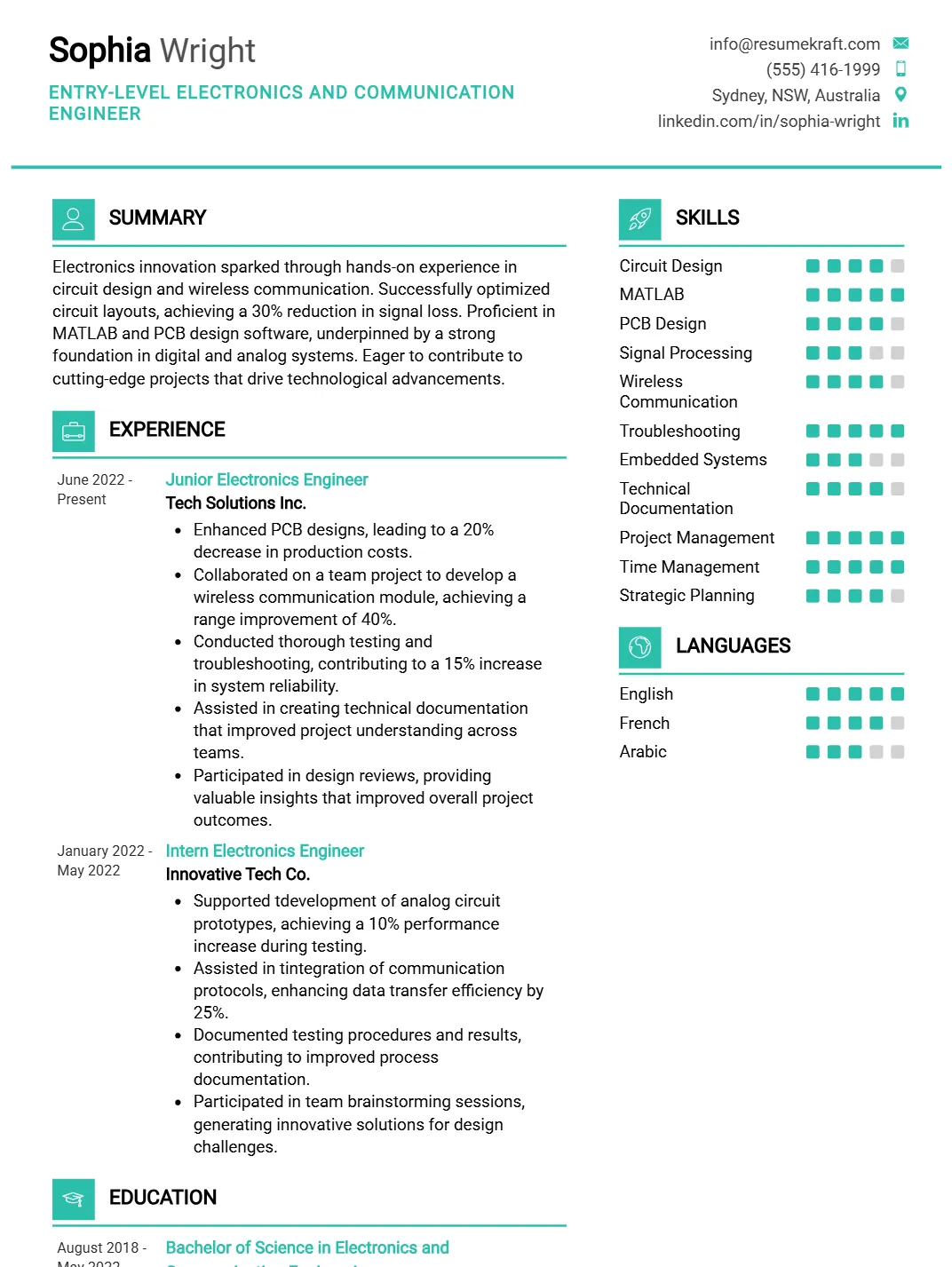
Why This Resume Works
This resume effectively showcases the candidate’s relevant skills, such as Circuit Design and Signal Processing, directly aligning with the requirements of an Entry-Level Electronics and Communication Engineer. Their experience as a Junior and Intern Electronics Engineer highlights practical knowledge gained over approximately three years. The format is clean and structured, enhancing readability for hiring managers and ATS systems alike. Additionally, strategic achievements related to PCB Design and Wireless Communication are emphasized, making the candidate stand out in a competitive field.
Junior Electronics and Communication Engineer Resume
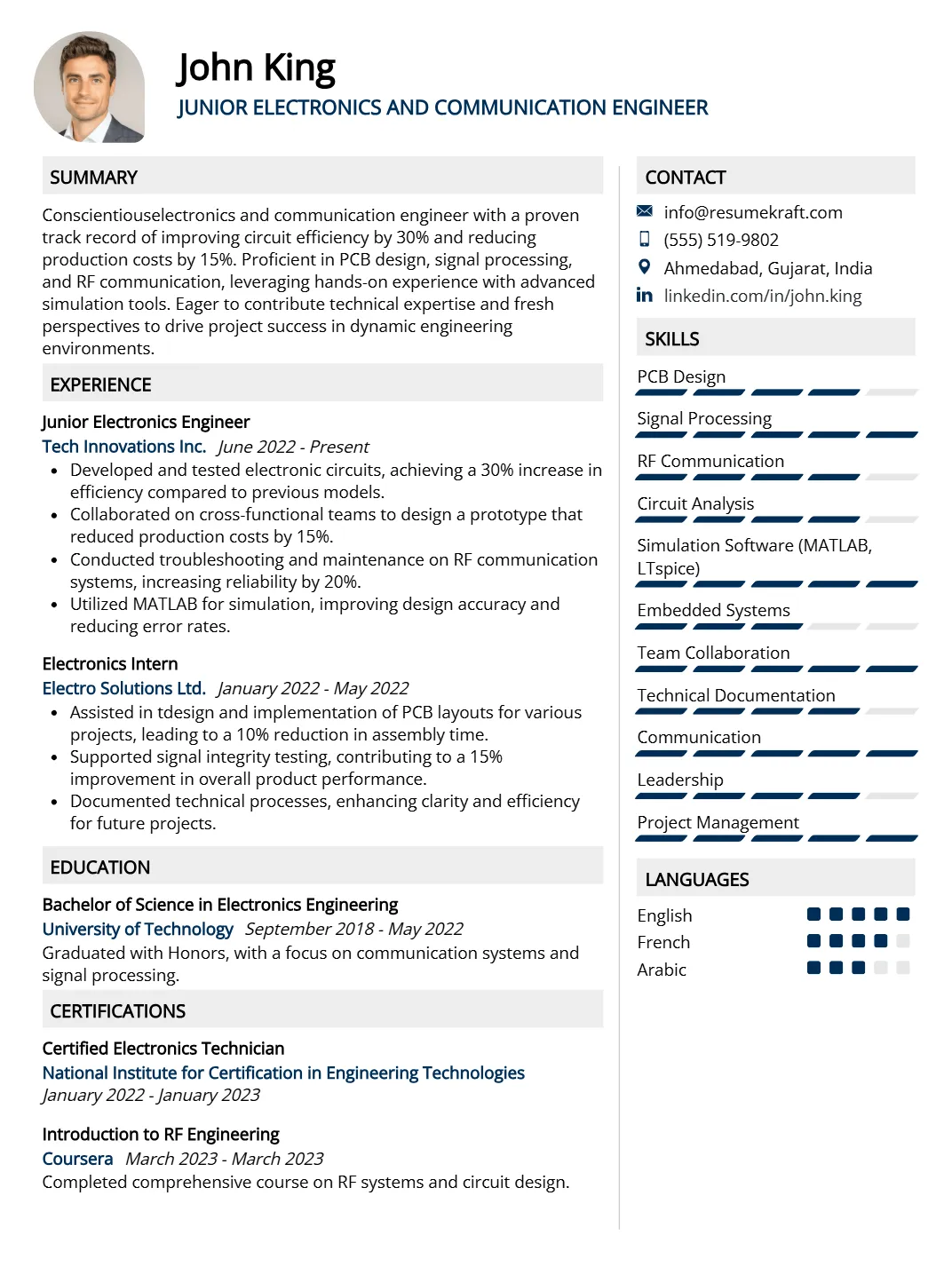
Why This Resume Works
This resume effectively showcases the candidate’s suitability for a Junior Electronics and Communication Engineer position through a clear emphasis on relevant skills like PCB Design and RF Communication. The structured format highlights three years of hands-on experience, including a role as a Junior Electronics Engineer, which directly aligns with industry expectations. It is ATS-compatible, utilizing keywords from the job description, ensuring visibility in automated screenings. Strategic presentation of achievements emphasizes practical application of technical skills, making it compelling for potential employers in this field.
Beginner Electronics and Communication Engineer Resume
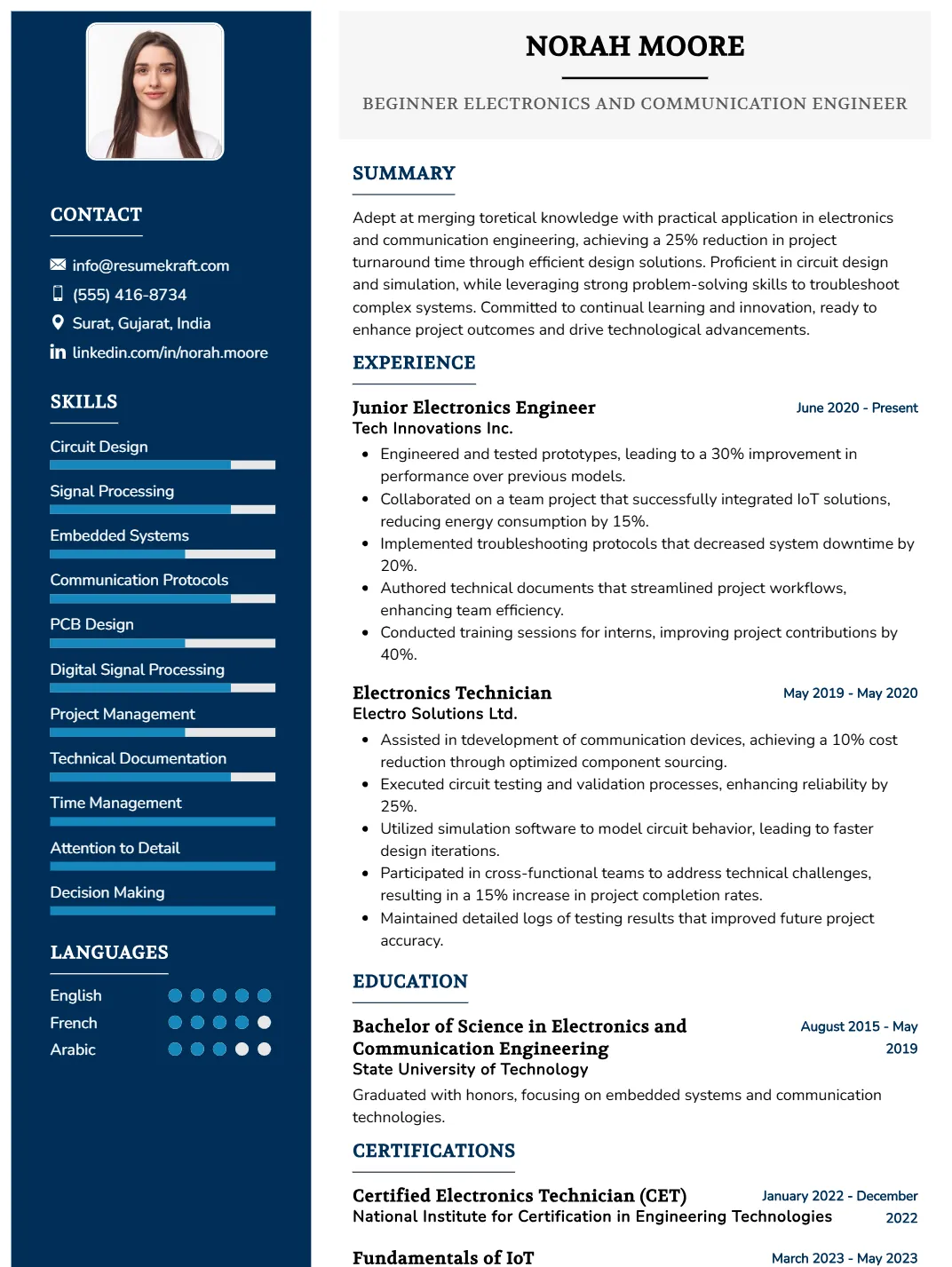
Why This Resume Works
This resume effectively highlights the candidate’s relevant skills, such as Circuit Design and Signal Processing, directly aligned with the Beginner Electronics and Communication Engineer position. With six years of experience as a Junior Electronics Engineer and Technician, it demonstrates practical expertise essential for entry-level roles. The structured format enhances readability, ensuring clear presentation of qualifications. Additionally, the use of industry-specific keywords boosts ATS compatibility. Strategic achievements in embedded systems and PCB design further showcase the candidate’s potential to excel in this field.
Student Electronics and Communication Engineer Resume
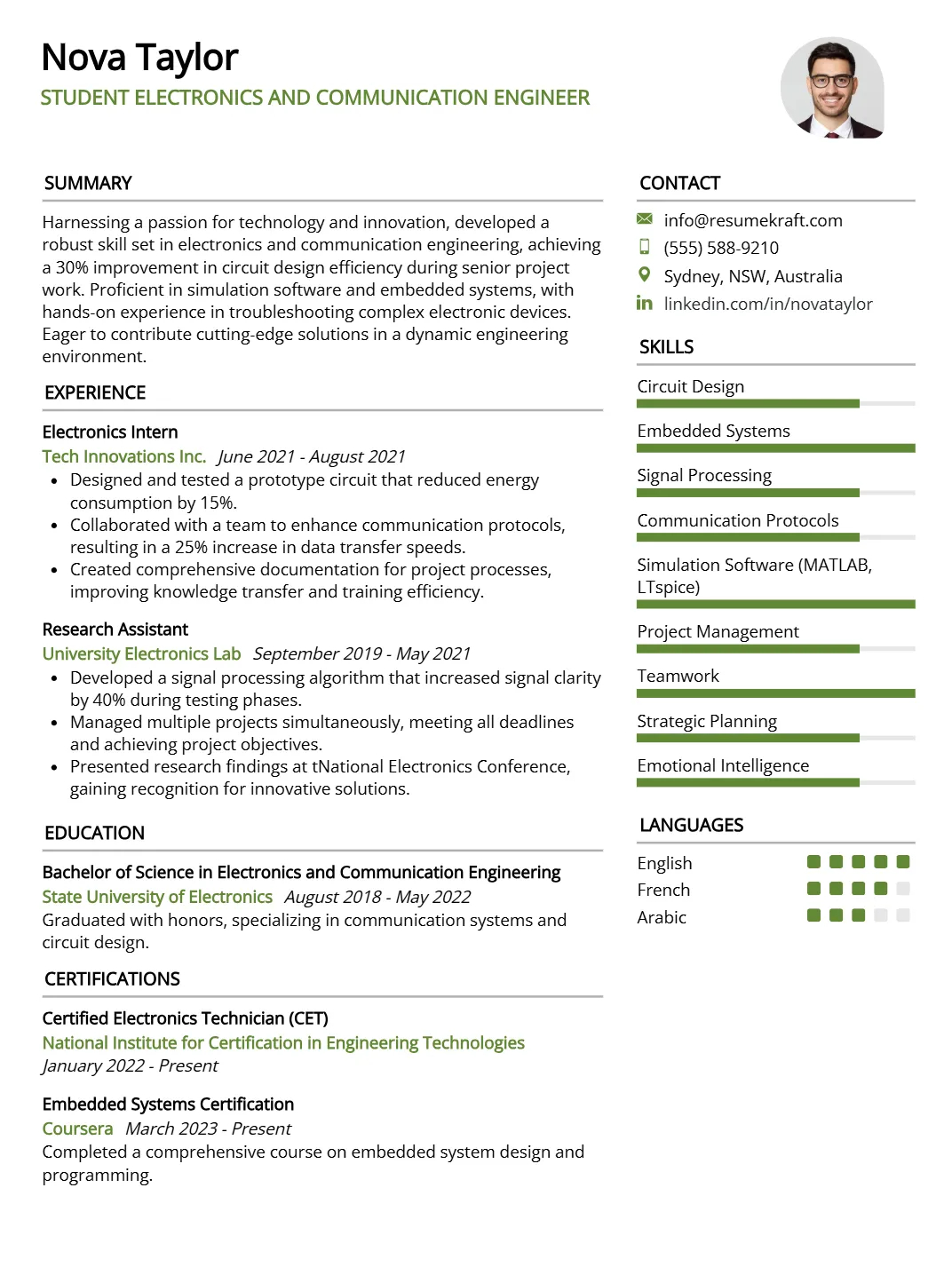
Why This Resume Works
This resume is effective for a Student Electronics and Communication Engineer position due to its targeted inclusion of relevant skills such as Circuit Design, Embedded Systems, and Signal Processing. The format clearly highlights approximately two years of hands-on experience through roles like Electronics Intern and Research Assistant, enhancing credibility. Its structured layout improves readability, ensuring ATS compatibility by incorporating industry-specific keywords. Additionally, strategic presentation of achievements in practical applications demonstrates the candidate’s readiness for real-world challenges in electronics and communication engineering.
No-Experience Electronics and Communication Engineer Resume

Why This Resume Works
This resume effectively highlights essential skills such as Circuit Design and Signal Processing, making it ideal for a No-Experience Electronics and Communication Engineer position. The applicant’s two years in roles like Electronics Intern and Trainee provide relevant experience despite the “no-experience” label. Its clear format enhances readability, ensuring ATS compatibility with industry-specific keywords. Additionally, the strategic presentation of technical achievements and projects demonstrates practical knowledge, which is crucial for attracting the attention of potential employers in this competitive field.
Electronics and Communication Engineer Intern Resume
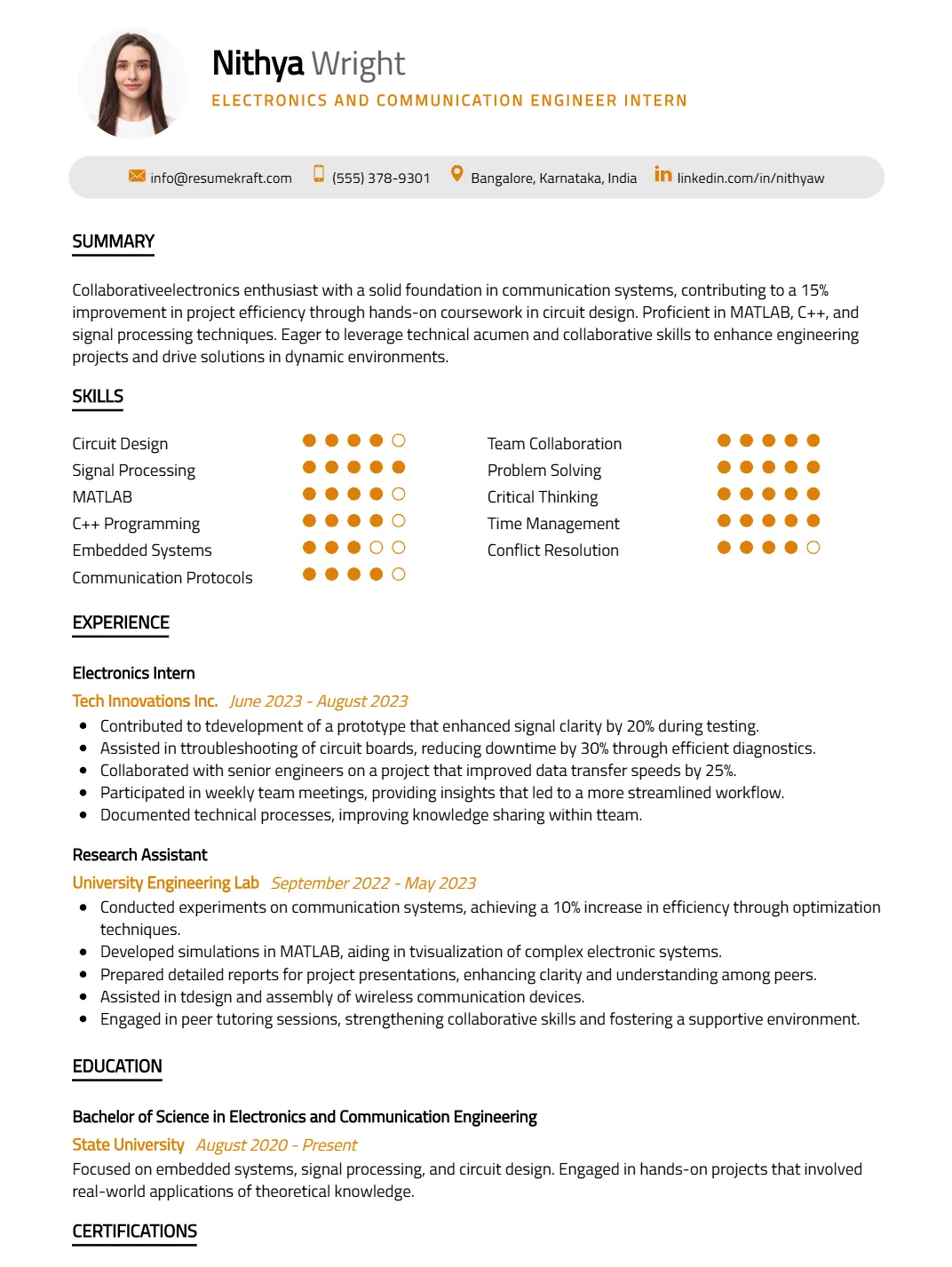
Why This Resume Works
This resume effectively highlights the candidate’s relevant skills in circuit design, signal processing, and embedded systems, directly aligning with the Electronics and Communication Engineer Intern position. The structured format enhances readability, showcasing both technical expertise and practical experience gained as an Electronics Intern and Research Assistant. It incorporates industry-specific keywords for ATS compatibility, ensuring visibility during screening. Additionally, strategic presentation of achievements emphasizes hands-on projects and successful contributions, making a compelling case for the candidate’s potential value to prospective employers in this field.
Electronics and Communication Engineer Fresher Resume
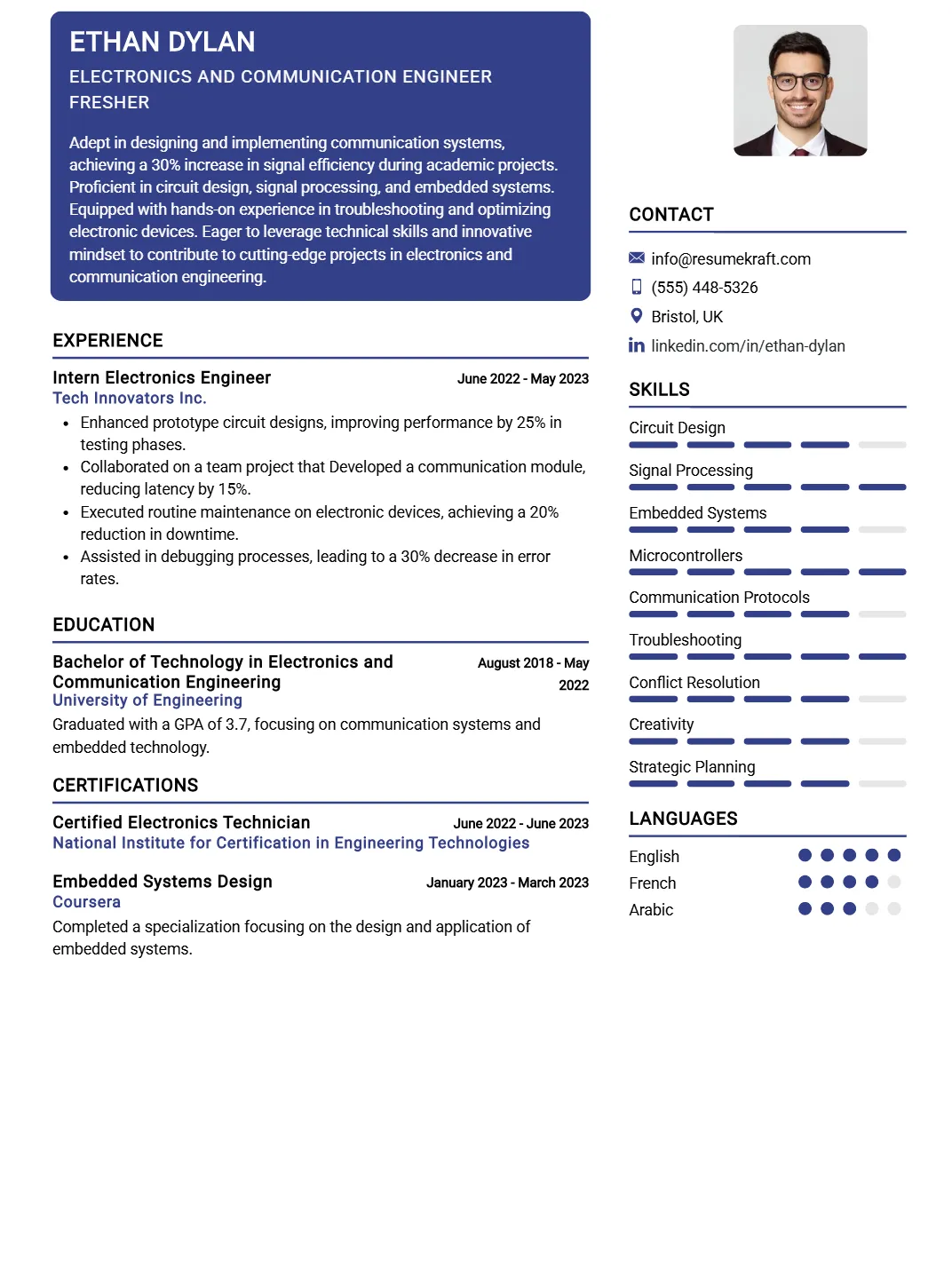
Why This Resume Works
This resume effectively showcases the candidate’s qualifications for the Electronics and Communication Engineer Fresher position by emphasizing relevant skills like Circuit Design and Signal Processing, which are crucial in this field. With nearly a year of internship experience, it highlights practical application of knowledge. The structured format enhances readability, making it ATS-friendly by incorporating industry-specific keywords. Additionally, strategic presentation of achievements related to embedded systems and communication protocols demonstrates the candidate’s potential value to employers in this competitive sector.
Trainee Electronics and Communication Engineer Resume
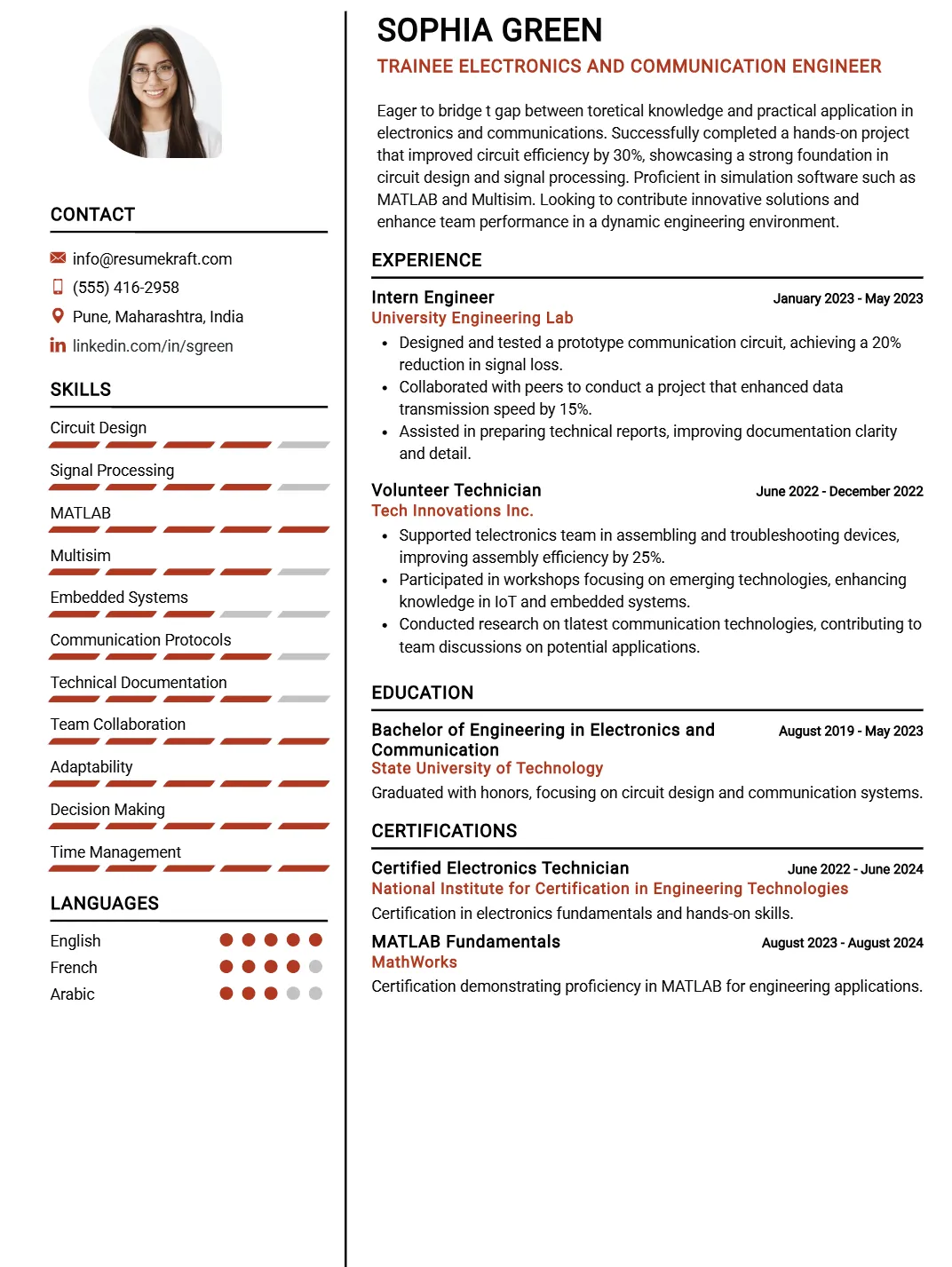
Why This Resume Works
This resume effectively highlights the candidate’s relevant skills in Circuit Design, Signal Processing, and Embedded Systems, making it well-suited for a Trainee Electronics and Communication Engineer position. The structured format clearly presents experience as an Intern Engineer and Volunteer Technician, showcasing practical application of technical skills. Additionally, the use of industry-specific keywords enhances ATS compatibility. By strategically emphasizing achievements in hands-on projects, this resume demonstrates the candidate’s ability to contribute immediately to engineering tasks within the field.
Graduate Electronics and Communication Engineer Resume
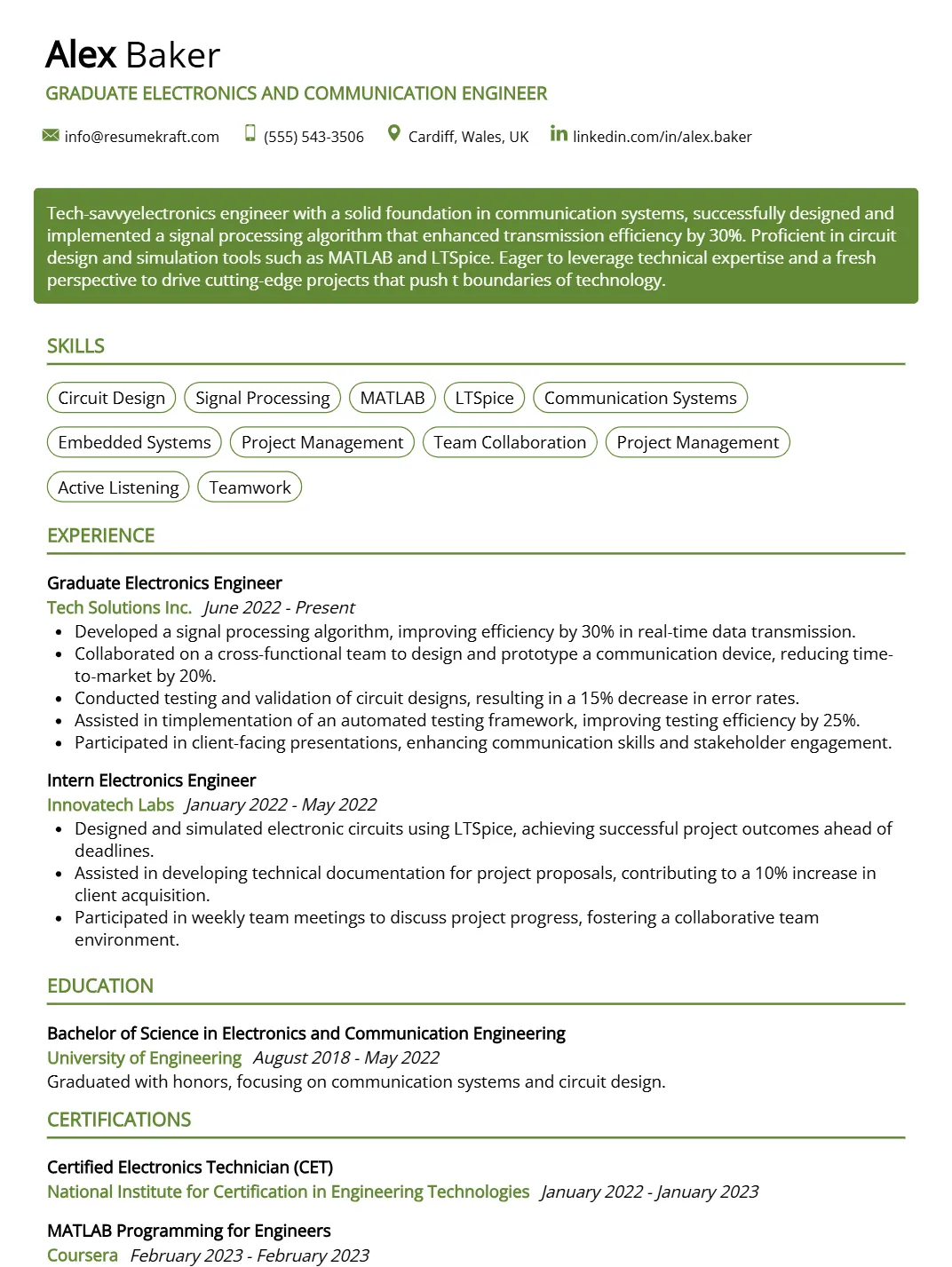
Why This Resume Works
This resume effectively highlights the candidate’s relevant skills, such as Circuit Design and Signal Processing, directly aligning with the requirements of a Graduate Electronics and Communication Engineer. The structured format ensures clarity, making key experiences and achievements easily accessible to hiring managers. It incorporates industry-specific keywords for ATS compatibility, enhancing visibility during digital screenings. By showcasing approximately three years of practical experience in both graduate and internship roles, the resume strategically emphasizes hands-on expertise that is crucial in this engineering field.
New Graduate Electronics and Communication Engineer Resume
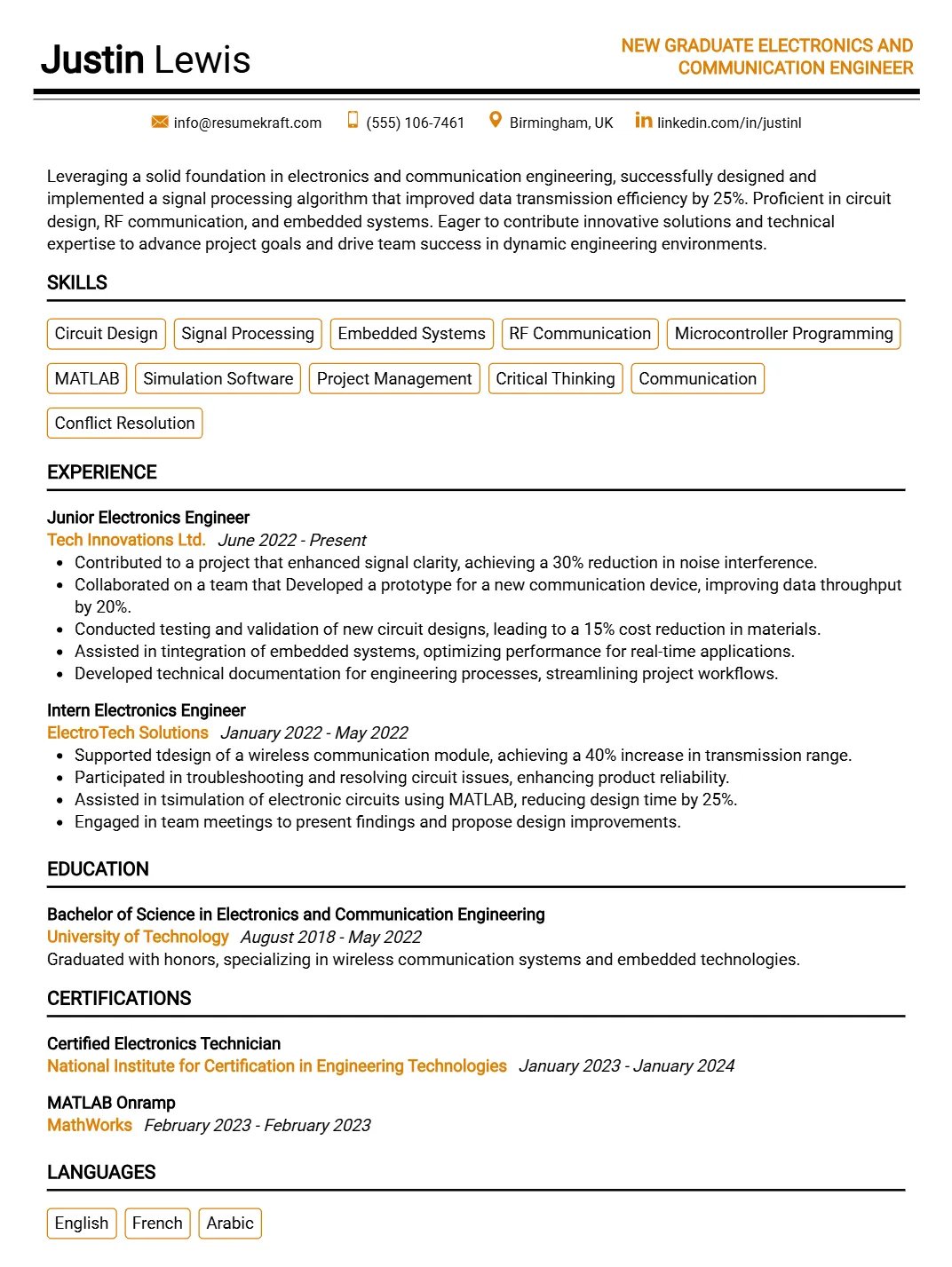
Why This Resume Works
This resume effectively highlights the candidate’s relevant skills in Circuit Design, Signal Processing, and Embedded Systems, which are crucial for a New Graduate Electronics and Communication Engineer role. With three years of applicable experience as a Junior and Intern Electronics Engineer, it demonstrates practical knowledge. Its clear format enhances readability, making it ATS-compatible by incorporating industry-specific keywords. Additionally, the strategic presentation of achievements showcases problem-solving abilities and project successes, aligning perfectly with employer expectations in this specialized field.
Entry level Electronics and Communication Engineer Resume
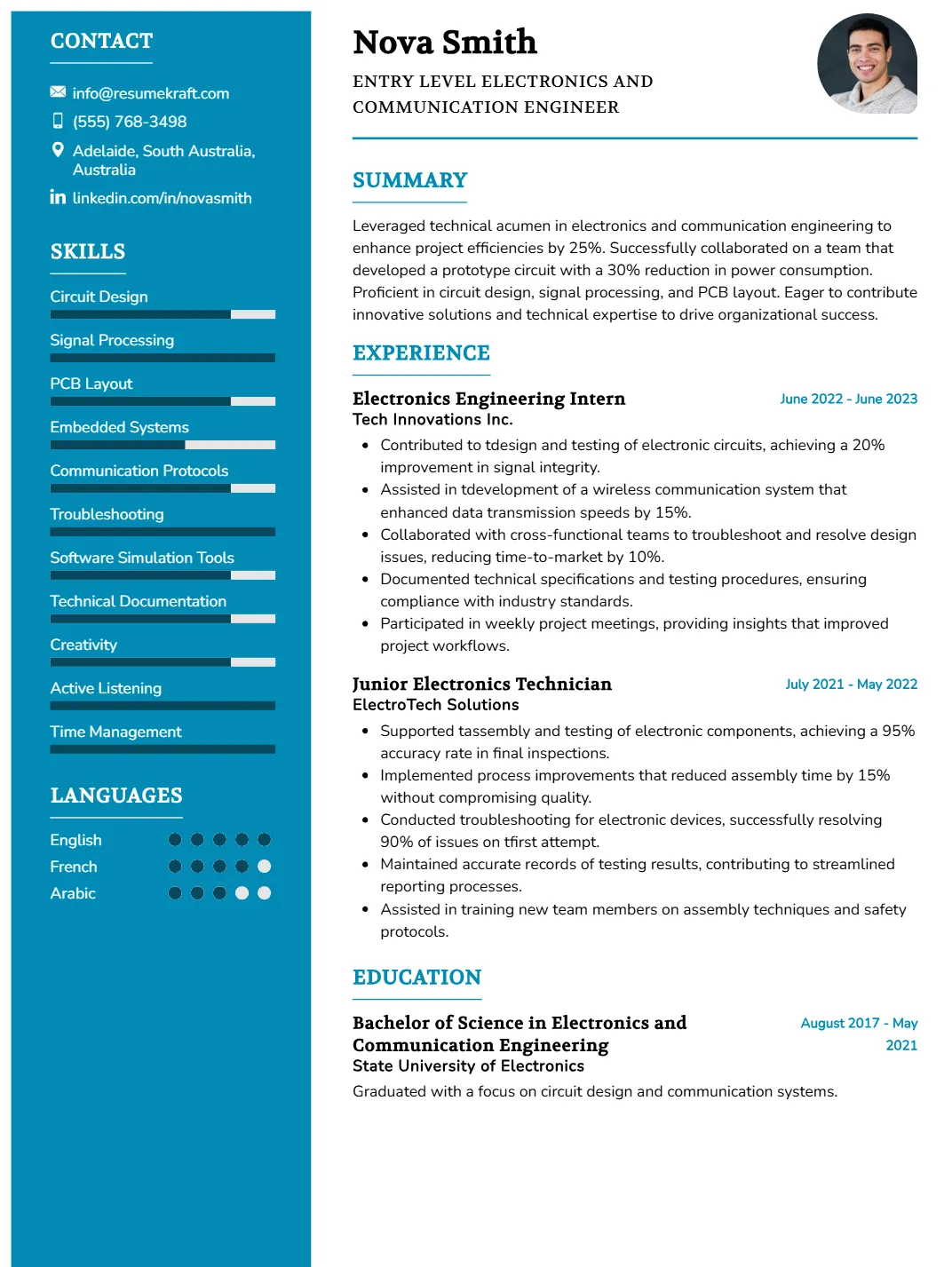
Why This Resume Works
This resume effectively highlights key skills like Circuit Design and Signal Processing, directly aligning with the requirements of an Entry Level Electronics and Communication Engineer. The structured format showcases relevant experience as an intern and technician, emphasizing hands-on expertise that employers seek. Its ATS-friendly design incorporates industry-specific keywords, ensuring compatibility with applicant tracking systems. Furthermore, strategic presentation of achievements in embedded systems and PCB layout demonstrates practical contributions, making this resume particularly compelling for hiring managers in the electronics field.
Fresher Electronics and Communication Engineer resume format
A well-structured resume format is crucial for fresh Electronics and Communication Engineers, as it helps showcase their academic achievements and skills effectively, making a strong first impression on potential employers.
- Use a clean, professional layout with plenty of white space to enhance readability, ensuring that key information such as your name, contact details, and sections are easily identifiable at a glance.
- Organize your resume into clear sections—Education, Skills, Projects, and Certifications—allowing recruiters to quickly find relevant information that highlights your qualifications as a fresher in the field.
- Choose a legible font like Arial or Calibri in 10-12 point size to maintain professionalism while ensuring that your resume is easy to read and visually appealing to hiring managers.
- Prioritize your projects and coursework related to electronics and communication at the top of your resume, showcasing your knowledge and practical skills that align with the job requirements.
- Keep your resume to one page, focusing on the most relevant experiences and skills, as recruiters typically prefer concise resumes that provide a quick overview of your qualifications.
Fresher Electronics and Communication Engineer resume with no experience
Freshers with no work experience can create an impressive Electronics and Communication Engineer resume by focusing on their academic projects and coursework. Highlighting relevant projects, such as designing a communication system or working on embedded systems, showcases practical knowledge. Additionally, incorporating any volunteer work or personal projects can demonstrate initiative and a commitment to the field, emphasizing transferable skills such as teamwork, problem-solving, and technical proficiency.
It’s crucial to frame these experiences in a way that reflects their value. For example, showcasing skills gained through academic achievements, such as proficiency in circuit design or programming languages, can help to create a well-rounded profile. Remember, valuable experience comes in many forms, and presenting it effectively can set freshers apart from the competition.
No work experience in engineering but I am a quick learner and eager to work.
Developed a microcontroller-based project that automated irrigation systems, enhancing my programming skills in C and understanding of circuit design principles through academic coursework and hands-on experimentation.
How to list your hard skills and soft skills on your fresher resume
In the competitive field of Electronics and Communication Engineering, showcasing both hard and soft skills on a resume is essential for fresh graduates. Hard skills, such as technical knowledge and proficiency in tools, can be highlighted through academic projects, online courses, and relevant certifications. Meanwhile, soft skills, including communication and teamwork, are crucial for effective collaboration in engineering environments. By articulating these skills clearly, new graduates can present themselves as well-rounded candidates ready to tackle the challenges of the industry.
Hard Skills for Fresher Electronics and Communication Engineer:
- Circuit Design: Understanding the principles of circuit design through academic coursework.
- Signal Processing: Knowledge gained from projects involving signal analysis and filtering techniques.
- VLSI Design: Familiarity with Very Large Scale Integration design concepts from coursework.
- Embedded Systems: Experience with microcontrollers and programming from personal projects.
- Communication Protocols: Understanding of protocols like SPI, I2C, and UART from academic studies.
- PCB Design: Skills in designing printed circuit boards using software tools.
- MATLAB: Proficiency in MATLAB for simulations and modeling, developed through coursework.
- Oscilloscope Operation: Practical experience with oscilloscopes during lab sessions.
- RF Engineering: Basic knowledge of radio frequency principles from academic projects.
- Digital Circuits: Understanding of digital logic design and applications learned in classes.
- Software Programming: Familiarity with programming languages like C/C++ or Python from coursework.
- Data Acquisition: Experience with data gathering techniques through projects and lab work.
- Technical Writing: Ability to produce clear technical documentation and reports.
- Project Management: Skills in managing academic projects and meeting deadlines.
- Troubleshooting: Experience in diagnosing and resolving technical issues during hands-on projects.
Soft Skills for Entry-Level Electronics and Communication Engineer:
- Team Collaboration: Ability to work effectively as part of a team, developed through group projects.
- Communication: Strong verbal and written communication skills for presenting ideas clearly.
- Problem-Solving: Aptitude for identifying issues and proposing solutions in engineering contexts.
- Adaptability: Willingness to learn new technologies and adapt to changing environments.
- Time Management: Ability to prioritize tasks and meet deadlines, honed during academic studies.
- Critical Thinking: Skill in analyzing information and making informed decisions.
- Initiative: Proactive approach to learning and seeking out new opportunities.
- Attention to Detail: Precision in work, particularly in design and analysis tasks.
- Creativity: Ability to think outside the box when developing innovative solutions.
- Leadership: Experience leading small groups during academic projects or activities.
- Conflict Resolution: Skills in mediating and resolving disagreements within team settings.
- Networking: Ability to build professional relationships through participation in workshops and events.
- Empathy: Understanding the perspectives of team members and collaborating effectively.
- Resilience: Capacity to handle setbacks and persist in overcoming challenges.
- Organizational Skills: Proficiency in keeping projects and tasks well-structured and organized.
How to list your education and certifications on your fresher resume
To effectively present their education, certifications, academic projects, and relevant coursework, freshers in Electronics and Communication Engineering should prioritize clarity and relevance. Highlighting specific subjects related to the job description, such as Digital Signal Processing or Microprocessors, can demonstrate your foundational knowledge. Additionally, detailing academic projects that showcase practical skills, like designing a communication system or conducting a research project, can provide tangible evidence of your capabilities.
Achievements, such as maintaining a high GPA or receiving accolades in engineering competitions, can further enhance your resume. Don’t forget to include any relevant certifications, such as those in programming languages or software tools used in the industry, as they emphasize your commitment to professional development and technical skills.
Graduated from ABC University with a degree in Engineering. Took some courses.
Bachelor of Engineering in Electronics and Communication, ABC University (2023). Relevant coursework: Digital Signal Processing, Communication Systems. Led a project on designing a wireless communication system, achieving a top 5 placement in the university project competition.
How to write your fresher Electronics and Communication Engineer resume summary or objective
A strong resume summary or objective is crucial for freshers applying for an Electronics and Communication Engineer position as it serves as their first opportunity to make an impression. This opening statement should encapsulate their potential, enthusiasm, and relevant skills gained through academic projects or internships, helping to offset their limited professional experience. Freshers should opt for a summary when they have a few relevant skills or experiences to highlight, while an objective is more suitable for those looking to express their career goals and the value they aim to bring to prospective employers.
I am a recent graduate looking for a job in electronics. I want to learn and grow in the field.
Enthusiastic Electronics and Communication Engineering graduate with hands-on project experience in circuit design and signal processing. Eager to leverage strong problem-solving skills and academic knowledge to contribute to innovative projects in a dynamic engineering team.
Additional sections for a fresher Electronics and Communication Engineer resume
Including additional resume sections can significantly enhance the profiles of fresh Electronics and Communication Engineer candidates, helping them showcase their potential, learning abilities, and commitment to the field despite limited professional experience. These sections can highlight relevant projects, volunteer work, and other accomplishments that demonstrate their skills and readiness for the industry.
- **Academic Projects**: Detailing projects completed during your studies allows you to showcase practical application of your knowledge, engineering skills, and problem-solving capabilities, which are crucial to prospective employers.
- **Internships**: Even short-term internships or co-op positions can demonstrate your initiative and eagerness to learn. They provide insights into real-world applications of your studies and relevant industry exposure.
- **Certifications**: Relevant certifications can strengthen your resume by showing your commitment to professional development and your willingness to learn new technologies or methodologies in electronics and communication.
- **Volunteer Work**: Highlighting volunteer experiences can illustrate your teamwork, leadership, and communication skills. It shows that you can contribute positively to community projects and work collaboratively with diverse groups.
- **Technical Skills**: A focused section on technical skills can emphasize your proficiency in software, tools, and languages relevant to electronics and communication engineering, demonstrating your preparedness for technical challenges.
Key takeaways for writing a professional fresher Electronics and Communication Engineer resume
- Highlight relevant academic projects, showcasing hands-on experience with electronics systems, circuit design, or communication technologies to demonstrate practical knowledge.
- Utilize resume templates tailored for engineering roles to ensure a professional layout and structure that effectively presents your skills and education.
- Focus on transferable skills such as teamwork, problem-solving, and communication gained through group projects or extracurricular activities to enhance your profile.
- Consider using an ai resume builder to streamline the process, ensuring your resume is optimized for keywords relevant to electronics and communication engineering jobs.
- Include internships, volunteer work, or relevant coursework to fill gaps in experience, emphasizing your eagerness to learn and adapt in a professional setting.
Frequently Asked Questions for Fresher Electronics and Communication Engineer Resumes
How long should my fresher Electronics and Communication Engineer resume be?
Your resume should ideally be one page long. As a fresher, you may not have extensive work experience, so it’s important to focus on presenting your skills, education, and relevant projects concisely. Use bullet points to highlight key achievements and responsibilities in academic projects or internships. This format allows potential employers to quickly grasp your qualifications while keeping your resume succinct and impactful.
What is the best format for a fresher Electronics and Communication Engineer resume?
The best format for your resume is a reverse-chronological layout. Begin with your contact information, followed by a strong objective statement tailored to the position. List your education next, emphasizing relevant coursework and projects. Include a section for skills, showcasing technical proficiencies and soft skills. Finally, add any internships or projects, detailing your contributions and outcomes. This structure emphasizes your most relevant qualifications first, making it easier for employers to recognize your potential.
How can I make my fresher Electronics and Communication Engineer resume stand out without work experience?
To make your resume stand out, emphasize academic projects, internships, and relevant coursework. Highlight any hands-on experience, like lab work or group projects, where you applied engineering principles. Showcase technical skills, such as programming languages or software tools you are proficient in. Incorporate any certifications or online courses you have completed. Additionally, consider including a summary of your strengths and interests to give employers insight into your passion for the field.
What should I include in my fresher Electronics and Communication Engineer resume if I have no relevant experience?
If you lack direct work experience, focus on your educational background and projects. Include your degree, relevant coursework, and any academic honors. Detail specific projects that demonstrate your engineering skills, such as design tasks or practical applications. Mention any technical skills related to electronics and communication, and if applicable, include internships, volunteer work, or extracurricular activities that highlight teamwork or leadership abilities. Tailor your resume to align with the job description where possible.

